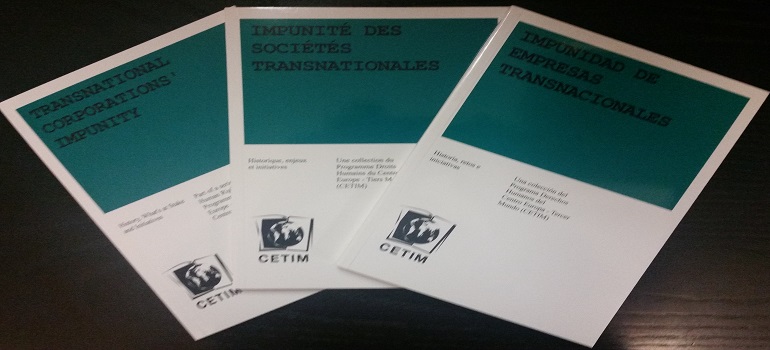
Multinationals with great economic and political power violate human rights with almost total impunity. The CETIM is bringing out a publication that will demonstrate the necessity and urgency of having a binding international instrument to sanction those multinationals responsible and enable the victims to obtain compensation.
Since it founding in 1970, the CETIM, in its role as a research and publication center, has studied the problems posed by transnational corporations (TNCs) in the development of the countries of the Global South, while emphasizing the responsibility of the countries of the Global North for the unjust international order. In its book, “Mal-développement”, published in 1975, the CETIM already drew attention to the nefarious role of “transnational enterprises” in the production of goods having no relation whatever to the elementary needs of the populations concerned, unjust trade and the increase of inequality. Since then, countless violations have been perpetrated with almost total impunity by certain multinationals. This situation the CETIM denounces in the book Transnational corporations’ impunity published this month.
The current capitalist system imposes a normative imbalance in favor of the multinationals which are the beneficiaries of an architecture of impunity. This means that these entities very often escape legal action owing to a lack of political will on the part of certain states but also because of a lack of appropriate legal instruments at the international level. Hence, there is particularly outrageous impunity regarding acts committed by private actors such as TNCs. This situation is the result of the offensive by financial capital and the adoption of a whole panoply of international norms favorable to TNCs (most notably multilateral and bilateral trade and investment agreements) since the 1990s, ignoring human rights. Further, the promotion of these entities to a level of privileged development agents by the promoters of neo-liberal globalization and wide-scale privatization of public services in their favor has reinforced their position to the point where they control the bulk of production and marketing of goods and services at the world-wide level. In our times, the TNCs have a determining influence over most political and economic decisions. They have also become major actors in human rights violations, in particular violations of economic, social and cultural rights. The CETIM, as a member of the Global Campaign to Dismantle Corporate Power and Stop Impunity, aims to dismantle this structure, known also under the term Lex Mercatoria (in keeping with the usage of Juan Hernandez Zubizarreta, a professor of international law and member of the Global Campaign).
Binding Norms
The CETIM’s book intends, on the one hand, to contribute to the public discussion about TNCs’ impunity and, on the other, to give concrete proposals to states, organizations and militants in the fight against this impunity. In fact, the CETIM has been militating for years for the creation of binding norms enabling the sanctioning of the business enterprises responsible for human rights violations as well as the filing of complaints by their victims. For now, there is no international instrument imposing binding regulations overall on the activities of TNCs. However, states are required to combat human rights violations, without any distinction nor hierarchy among these rights. In this regard, the fight against impunity for human rights violations requires that those responsible be sanctioned and forced to repair the harm done.
Catastrophes Caused by Multinationals
A majority of the catastrophes having dramatic consequences for human beings and the environment, have been caused – directly or indirectly – by TNCs. From the explosion of an agro-chemical factory in Bhopal (India) to the oil pollution in the Ecuadorian Amazon, from child labor in the cacao plantations in Africa to the textile factories of Bangladesh, colossal disasters, with multiple human rights violations are imputable to TNCs and to the greed of their shareholders and directors. The vast majority of victims are waiting for the harm to be repaired and the guilty subject to a sanction proportional to the seriousness of their acts. Will the victims wait in vain? Does the current legal framework correspond to their expectations? If not, how can the impunity enjoyed by the perpetrators of these human rights violations and crimes be ended? It is also these questions that the CETIM publication Transnational corporations’ impunity, distributed in September 2016, tries to answer.
You can order “Transnational corporations’ impunity” by writing to contact@cetim.ch or by calling +41 (0)22 731 59 63.
You can also download it here.